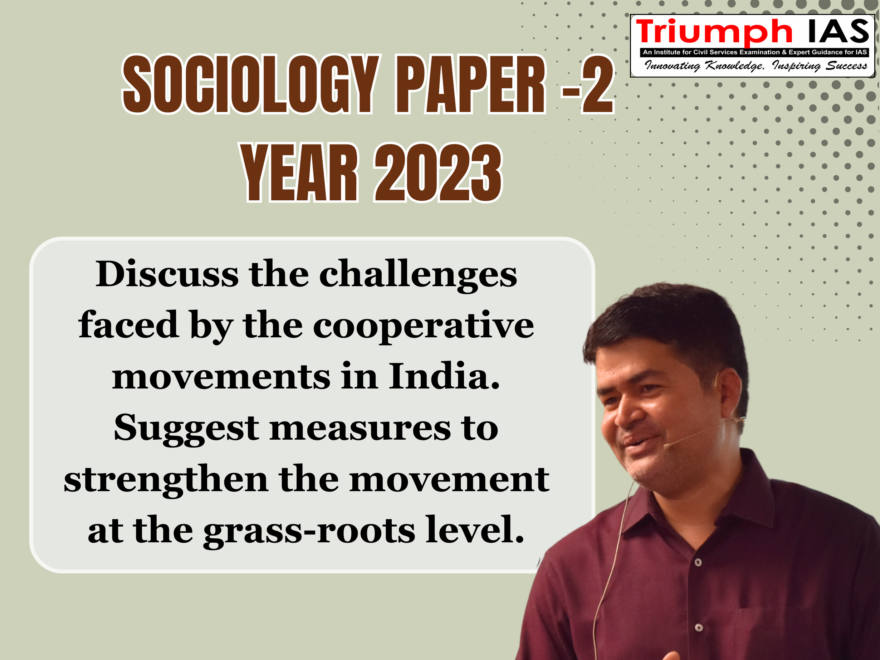Discuss the challenges faced by the cooperative movements in India. Suggest measures to strengthen the movement at the grass-roots level.
Section: B.
Sociology Paper 2023 Analysis.
Relevant for Paper-1 : RURAL AND AGRARIAN TRANSFORMATION : COOPERATIVES
Question- 8 (B): Discuss the challenges faced by the cooperative movements in India. Suggest measures to strengthen the movement at the grass-roots level.
(20 Marks)
|
Introduction: Explain the core principle of cooperatives. Main Body: Mention challenges faced by cooperatives in terms of political interference, evolutionary stagnation bureaucratic overreach, erosion of democratic values, regional imbalances, power conflicts, hijacking by elites, then provide suggestions. Conclusion: On the lines of cooperative movement’s true essence as a dynamic force for socio-economic progress. |
Introduction
Cooperative movements in India, anchored in principles of voluntary participation, democratic control, and community welfare, serve as vital instruments for rural development. Originating from the vision of leaders like C. Subramaniam, these movements face multifaceted challenges that impede their effectiveness and deviate from their original ethos.
Main Body
Challenges Faced by Cooperative Movements:
-
- Political Interference: The persistent intrusion of political parties, as observed in studies by K. N. Raj, distorts the cooperative sector’s functions and compromises decision-making processes to align with political agendas.
- Erosion of Democratic Values: Carl Taylor’s observations highlight that political interference erodes the cooperative structures, undermining the solidarity initially fostered among community members.
- Evolutionary Stagnation: PR Dubhasi’s perspective underscores that the static nature of earlier cooperative models hinders adaptation to evolving socio-economic needs, necessitating a dynamic approach.
- Power Conflicts: BS Bavishkar’s analysis reveals that power conflicts have impeded the growth of cooperatives, resulting in a politicized environment and the abandonment of active community participation.
- Hijacking by Elites: Daniel Thorner’s insights indicate that wealthier individuals manipulate cooperatives for personal gain, reflecting caste-based economic disparities within village structures.
- Bureaucratic Overreach: Excessive bureaucracy and red tape, as a challenge noted by scholars, hamper the agility and responsiveness of cooperative movements.
- Regional Imbalances: Disparities in cooperative development across regions, such as in Maharashtra, Gujarat, Bihar, and Uttar Pradesh, contribute to unequal growth and impact.
Measures to Strengthen Cooperative Movements at the Grass-Roots Level:
-
- Promoting Autonomy: Safeguarding cooperatives from political interference by implementing policies that ensure autonomy and democratic decision-making.
- Adaptive Models: Embracing dynamic models that can evolve with changing socio-economic landscapes, as suggested by PR Dubhasi, to address emerging needs effectively.
- Community Empowerment: Fostering active community participation by resolving power conflicts, as emphasized by BS Bavishkar, to re-establish the cooperative movement as a people-centric initiative.
- Transparency and Accountability: Implementing measures to enhance transparency and accountability in cooperative operations, reducing the potential for elite exploitation.
- Reducing Bureaucratic Hurdles: Streamlining bureaucratic processes to enhance the efficiency and agility of cooperative movements at the grassroots level.
- Equal Regional Focus: Ensuring equitable development by addressing regional imbalances through targeted policies and resource allocation.
Conclusion
While cooperative movements in India hold the potential to empower communities and drive rural development, their effectiveness is hindered by persistent challenges. Adopting adaptive models, ensuring autonomy, and addressing issues of political interference and bureaucratic inefficiencies are crucial for revitalizing and strengthening cooperative movements at the grass-roots level. A renewed commitment to democratic values and community participation can restore the cooperative movement’s true essence as a dynamic force for socio-economic progress.
Related Blogs…
 |
 |

To master these intricacies and fare well in the Sociology Optional Syllabus, aspiring sociologists might benefit from guidance by the Best Sociology Optional Teacher and participation in the Best Sociology Optional Coaching. These avenues provide comprehensive assistance, ensuring a solid understanding of sociology’s diverse methodologies and techniques.
META TAGS:
Taylorism, Scientific Management, Frederick Taylor, Efficiency, Standardization, Specialization, Worker Exploitation, Organizational Hierarchy, Merits and Demerits, Contemporary Organizational Functioning, Sociology Question Paper, Sociology Question Paper 2023, Sociology Question Paper CYQ, Sociology Question Paper UPSC, What is Taylorism? Analyze its merits and demerits.
Why Vikash Ranjan’s Classes for Sociology?
Proper guidance and assistance are required to learn the skill of interlinking current happenings with the conventional topics. VIKASH RANJAN SIR at TRIUMPH IAS guides students according to the Recent Trends of UPSC, making him the Best Sociology Teacher for Sociology Optional UPSC.
At Triumph IAS, the Best Sociology Optional Coaching platform, we not only provide the best study material and applied classes for Sociology for IAS but also conduct regular assignments and class tests to assess candidates’ writing skills and understanding of the subject.
Choose The Best Sociology Optional Teacher for IAS Preparation?
At the beginning of the journey for Civil Services Examination preparation, many students face a pivotal decision – selecting their optional subject. Questions such as “which optional subject is the best?” and “which optional subject is the most scoring?” frequently come to mind. Choosing the right optional subject, like choosing the best sociology optional teacher, is a subjective yet vital step that requires a thoughtful decision based on facts. A misstep in this crucial decision can indeed prove disastrous.
Ever since the exam pattern was revamped in 2013, the UPSC has eliminated the need for a second optional subject. Now, candidates have to choose only one optional subject for the UPSC Mains, which has two papers of 250 marks each. One of the compelling choices for many has been the sociology optional. However, it’s strongly advised to decide on your optional subject for mains well ahead of time to get sufficient time to complete the syllabus. After all, most students score similarly in General Studies Papers; it’s the score in the optional subject & essay that contributes significantly to the final selection.
“A sound strategy does not rely solely on the popular
Opinion of toppers or famous YouTubers cum teachers.”
It requires understanding one’s ability, interest, and the relevance of the subject, not just for the exam but also for life in general. Hence, when selecting the best sociology teacher, one must consider the usefulness of sociology optional coaching in General Studies, Essay, and Personality Test.
The choice of the optional subject should be based on objective criteria, such as the nature, scope, and size of the syllabus, uniformity and stability in the question pattern, relevance of the syllabic content in daily life in society, and the availability of study material and guidance. For example, choosing the best sociology optional coaching can ensure access to top-quality study materials and experienced teachers. Always remember, the approach of the UPSC optional subject differs from your academic studies of subjects. Therefore, before settling for sociology optional, you need to analyze the syllabus, previous years’ pattern, subject requirements (be it ideal, visionary, numerical, conceptual theoretical), and your comfort level with the subject.
This decision marks a critical point in your UPSC – CSE journey, potentially determining your success in a career in IAS/Civil Services. Therefore, it’s crucial to choose wisely, whether it’s the optional subject or the best sociology optional teacher. Always base your decision on accurate facts, and never let your emotional biases guide your choices. After all, the search for the best sociology optional coaching is about finding the perfect fit for your unique academic needs and aspirations.
Follow us :



Find More Blogs…
| Compare and contrast Karl Marx’s and Max weber’s | Karl Marx- Historical Materialism |
| Position of Women In the Modern Indian Society | Sociology: Social system and pattern variables |
KEYWORD: Challenges faced by the cooperative movements in India,Challenges faced by the cooperative movements in India,Challenges faced by the cooperative movements in India,Challenges faced by the cooperative movements in India,Challenges faced by the cooperative movements in India,Challenges faced by the cooperative movements in India,Challenges faced by the cooperative movements in India,Challenges faced by the cooperative movements in India,Challenges faced by the cooperative movements in India,Challenges faced by the cooperative movements in India,Challenges faced by the cooperative movements in India,Challenges faced by the cooperative movements in India,Challenges faced by the cooperative movements in India,Challenges faced by the cooperative movements in India,Challenges faced by the cooperative movements in India,



